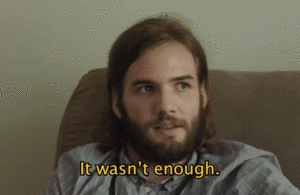In his book, “Vers la sobriété heureuse”, Pierre Rabhi — a French thinker, writer, farmer, and environmentalist who dedicated his life to finding a way to cohabitate with our planet and its souls — tells the story of a village chief in Burkina Faso who shares with him about giving half his land to the next village to feed its inhabitants.
— We only need half of the field to feed our people, the other half will be given to the next village’s inhabitants.
— Why not harvest the whole field and sell what you don’t need?
— Because we don’t need it.
The idea of living our life only to buy more things we don’t even need, became the only way to live our life, turning from working to live to living to work. So how did that happen?
Running after things we don’t need and can’t afford, that don’t even make us happy
“We work jobs that we hate, to buy things we don’t need, to impress people we don’t like”. Brilliant David Fincher in his as equally brilliant Fight Club had put his finger on something so true.
By chasing after a never-ending growth, our society switched models to consumer-driven growth-oriented ones: more vacation leave, more countries to visit, hotels with more stars, a bigger house…when does it stop?
As this new paradigm could not leave the planet more resourceless and tired, the emergence of the third world always wanting to embrace what the West has, makes it even more global.
While most people don’t have the opportunity to work little enough to keep living a decent life, the minority who does, won’t even consider that as an option. But even in this consumerist world, it’s hard to believe that people who have the choice to have time and freedom to discover the world, are voluntarily willing to work way more, just to get some time in fancy instagrammable spots.
The pressure of climbing up the professional ladder
There is another conundrum for the fortunate who can have a career and can choose the field they want to study and the job they want to get. The one that pushes us to continuously climb up the professional ladder. Going from Junior to Senior, to Head of, to Head of all the Heads of, to always having more people to manage and projects to handle in order to keep on going up, wherever that up leads, whatever we really want to go up there or not.
As we buy things we don’t need because “that’s how it works”, we try to make our way up to the top because it seems like it is the only logical way. And if you think all of this depends on the country you work it, think twice. Japan, one of the richest countries on earth, has only 42% of their workers happy with their job.
Spoiler alert, money buys you freedom, but not necessarily happiness.
And if it obviously allows you to be sustainable and take care of your family, it also can drive you into a pit of constant dissatisfaction and chasing after what society has planned for you, without asking you first if you were fine with it.
Rich people’s problems vs Third World problem
Let’s not compare what is not comparable. When around 258 million people in 58 countries and territories faced acute food insecurity at crisis or worse levels in 2022, it is hard to listen to the ones who have the choice to work more to earn more money.
The real problems are here, and there are a lot of them: differences in chances, professional opportunities, presence of racism, differences in passport strengths… the majority has to fight harder than anybody else.
So why — when it could be easy for some people — to choose a simpler life over more money to buy the time nobody can get back, their state of mind makes them go the other direction?
Do we make the wrong choices because of money, or because of the values of the society we grew up in?




